As families struggle to make ends meet, workers cope with limited hours or lost jobs, and frontline and emergency management professionals are overtaxed as they fight to keep our communities healthy and safe, the White House and Senate leadership in D.C. are holding up critical aid to workers and our communities.
What’s the hold up? the biggest sticking point is a $500 billion — that’s billion with a “b” – corporate slush fund that would be controlled by Steve Mnuchin and the Treasury Department with virtually no oversight. The fund would allow the Treasury Department to waive any protections in the bill to require companies receiving slush fund money to use it to retain workers. On top of that, the names of the companies receiving funds would be withheld from the public.
While 80 million Americans are in lock down across the country to combat the spread of COVID-19, in dire need of immediate assistance from the federal government, the White House and Republican leadership are working with corporate lobbyists to make sure they don’t let this crisis go to waste.
It’s unclear when Congress will pass this important coronavirus stimulus bill. Originally, legislators hoped to have a deal by last Friday, with a potential vote coming this past weekend. As of right now, the bill has only a limited extension of unemployment insurance and no provisions to protect families from evictions and foreclosures. And maybe the most glaring omission, as currently constructed, the bill provides little to no new assistance for state and local governments.
At a time like this, legislators should be prioritizing the health, safety and well-being of families and communities, not setting up a corporate slush fund at the behest of big-dollar lobbyists. Specifically, communities need significant funding for flexible, emergency fiscal assistance directed as quickly as possible to stabilize state and local governments, including school districts.
State and local governments are being hit with immediate and significant revenue declines. This has a direct effect on their ability to keep those vital frontline and emergency management workers on the job. At the state level, serious shortfalls will occur across its revenue streams, from personal and corporate income taxes to sale taxes to other sources like gaming taxes, toll receipts, and wine and spirit sales. Most municipalities in our Commonwealth rely on the earned income tax as a major source of revenue, as well as local business taxes. With sweeping and necessary business closures, this revenue stream is at risk. Property tax collections that support school districts and municipalities are also expected to take a substantial hit as families and businesses struggle to keep up tax payments.
During the deepest part of the great recession in 2009 and 2010, the federal government delivered stimulus dollars to stabilize state and local governments and our public schools. The American Recovery and Reinvestment Act preserved the jobs of 250,000 teachers and other educators and hundreds of thousands more workers on the state and local levels protecting the public’s health, safety, and well-being.
We are likely to be facing a government fiscal challenge even more daunting than what we faced then. And the question right now is the question we often find ourselves asking: who does Congress work for? Will they use this crisis as a means to shovel even more taxpayer dollars to corporate interests with few strings attached? Or will they work on behalf of the people to provide the necessary immediate assistance to families and communities in dire need?
Congress must act immediately and decisively to ensure that families in need, along with those now on the front lines of this crisis, and those who will be serving and supporting Pennsylvanians as we rebound from this crisis, have the resources needed to conduct their vital work.
David Fillman is Executive Director of ASCME Council 13
